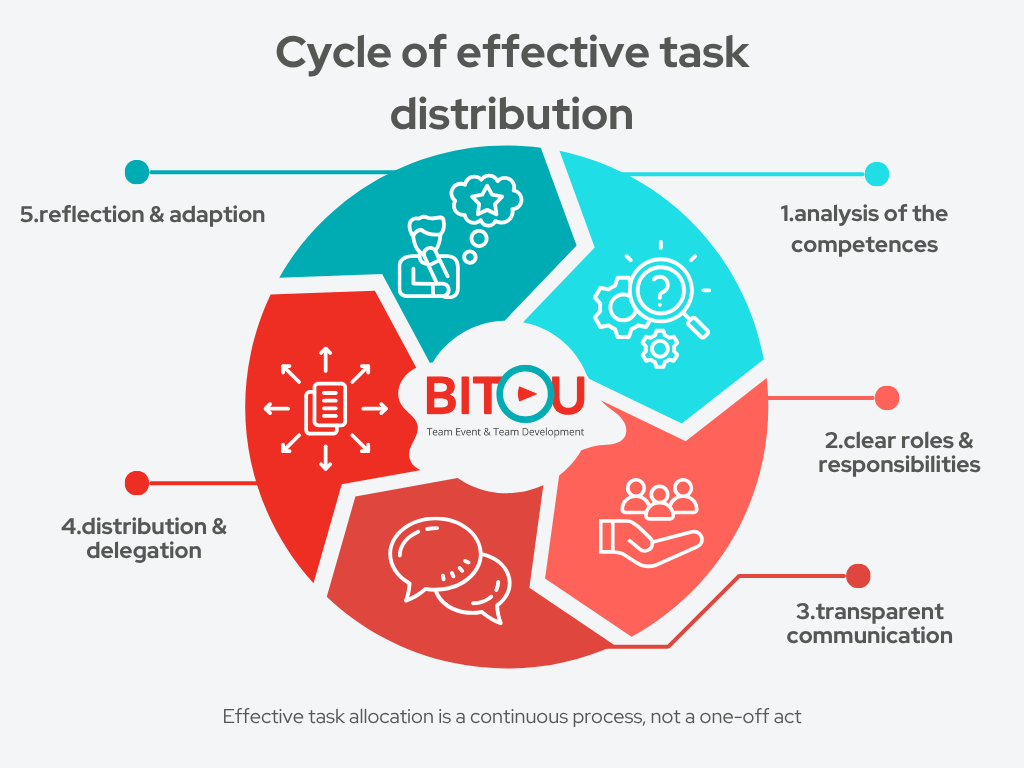Effective task distribution in a team: strategies for managers

A team is only as strong as its cooperation – and this stands or falls with the way in which tasks are distributed. Anyone who has experienced projects coming to a standstill because responsibilities are unclear or tasks are duplicated knows that good task allocation is leadership work – not a matter of chance.
Why effective task allocation is crucial
Task allocation is far more than just administration. It influences team dynamics, motivation and efficiency – and ultimately determines the success of the project.
A well thought-out distribution utilises strengths, conserves resources and promotes fairness. Conversely, unclear responsibilities lead to excessive demands, frustration and conflicts.
The management style is also reflected in the way tasks are handled. Good managers share responsibility, create trust and encourage initiative. This creates a sustainable team culture based on clarity and respect.
Effective task allocation does not start with tools, but with an understanding of people, competences and communication.
The basics of successful task allocation
Effective distribution of tasks means harmonising skills, interests and responsibilities in a targeted manner. A good manager asks themselves:
Who can best fulfil this task – professionally and personally?
Which task promotes the development of the team member?
How does the task fit into the overall objective of the project?
This creates efficiency, motivation and a sense of purpose.
Roles, competences and responsibilities
Unclear responsibilities lead to frictional losses. The basis of any good division of responsibilities is:
- Role clarification: Who is responsible for what?
- Expertise comparison: What strengths does each person bring to the table?
- Responsibility: Who decides, who executes?
Fairness and transparency
Transparent decisions strengthen trust in the team. Managers should disclose,
- why tasks were assigned,
- how the decision was made,
- and how they contribute to the team goal.
Development instead of routine
Efficient task allocation should also offer learning opportunities. This means
- Rotate tasks in a targeted manner,
- Allow and reflect on mistakes,
- Check regularly whether the distribution is still correct.

The role of the manager
Modern leadership means not only organising, but also developing people. A good manager is a coach, coordinator and motivator.
Trust is the basis for this: employees must be allowed to take responsibility – and managers must be able to let go.
Too much control inhibits personal responsibility, too little creates uncertainty.
The solution lies in situational leadership: the more experienced the team member, the more freedom they have. Those who regularly share responsibility build up junior managers, create space for strategic issues and strengthen loyalty.
Tools and methods that support
Digital tools facilitate the distribution of tasks through transparency and traceability. Popular systems:
- Trello: Visual project management with a clear overview of tasks.
- Asana: Ideal for complex projects with deadlines and responsibilities.
- ClickUp / Monday.com: Offer workload analyses and automation.
In addition, agile methods such as Kanban and Scrum flexible processes and promote personal responsibility.
Regular check-ins, 1:1 meetings and retrospectives strengthen communication and keep teams able to learn.
Common mistakes in the distribution of tasks
- Overworking of individual employees
→ Distribute tasks evenly and transparently, check workload regularly. - Unclear communication
→ Every task needs a clear goal, a person in charge and a deadline. - Rigid structures
→ Regularly adapt tasks and actively obtain feedback.
Conclusion: The path to a balanced team performance
Effective task allocation is a key element of modern leadership. Those who distribute tasks consciously, fairly and according to strengths create clarity, trust and motivation in the team.
Leadership does not mean doing everything yourself, but enabling responsibility. This creates a culture in which efficiency and team spirit go hand in hand.
Good task distribution not only makes projects more successful – it makes teams stronger.
Bonus: Exclusive BITOU checklist for managers
Reflective task allocation is a key success factor for effective team leadership. To support you in this, we at BITOU have developed an exclusive checklist for the effective distribution of tasks.
This practice-orientated overview will help you,
- analyse task and responsibility structures,
- assess the fit between competence and task,
- and promote transparency and fairness within the team.
Download now for free:
About the author
Pia Neugebauer is Managing Director and Head of HR at BITOU GmbH and has many years of experience in HR management and leadership styles.
With a flair for interpersonal dynamics and a great deal of enthusiasm for sustainable change processes, she regularly writes about topics that really help teams move forward.
You can find out more about Pia and current projects here.





